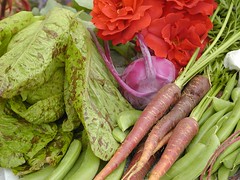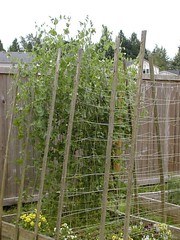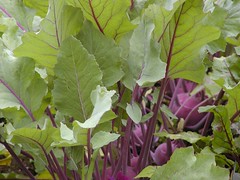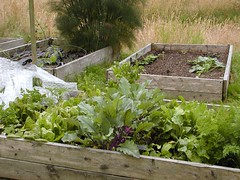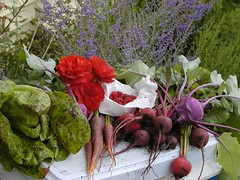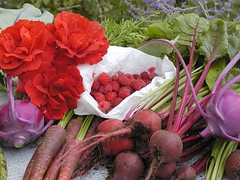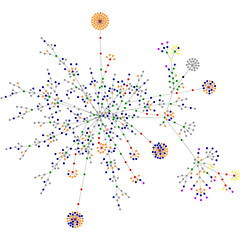"Honey, when he gets here I'm going to let him have it. I can do that, too, you know." Helen Hauff was speaking to me. I had been sitting in front of her fruit stand for about an hour yesterday when this proclamation burst forth. She was a pleasant hostess, but every minute longer I sat there seemed to irritate her more about the fact that the peaches she ordered hadn't shown up on time.
Time? It was about 1:30 yesterday afternoon. We were sitting on plastic chairs under the awning of her stand. The temperature was just getting hot, about 80 degrees.
The day had started out much cooler. At about 8:00 AM I started my drive towards Peshastin, just east of Leavenworth, along Highway 2. A little more than a half hour later and I was sitting in a booth in the Index Cafe, ordering breakfast and preparing to read a little of Neil Stephenson's novel,
Confusion. The meal at the Cafe was typical: tasty, loads of fat, and large. The service was also typical: prompt and friendly, relaxed. I didn't finish the meal, but I did get ten pages read in between bites, listening to the conversation at the table next to me, and taking time to stair at the mountains.
It was a chilly morning. Clouds hung over much of Puget Sound in the morning. The mountains were the same, except that the clouds seemed a little closer and the tops of the mountains were assumed. Such grey days are to be relished, I thought, as I stared at where the top of Index point should be seen. A cloud obscured the top of the point. Whisps of it, like cotton candy, seemed to swirl around the trees that could be seen under the bottom edge of the cloud.
Soon enough it was time to head over the Pass to eastern Washington. I half expected to find sunshine, though the radio report said that I shouldn't. Luckily, the weather report is often wrong here. Leavenworth was covered in bright morning sunshine. The place not only was less busy, it felt that way. There were fewer tourists here than on weekends, so less traffic, too. The public pool already had several occupants, mostly children while moms sat in chairs on the side and chatted, keeping at least one eye on the kids.
I got to the Hauff family farm and fruit stand just before 11 AM. A couple of cars were already parked in the drive way when I pulled in. Helen Hauff, the owner of the stand since the 1950s was working the counter. Helen is about 4' 11" tall and maybe 90 pounds. She's 77 years old this year, but you wouldn't know it. Her hair is white, but her skin is surprisingly smooth and she's a spry woman, full of life. In the three years I've been going to her stand, she's always hauling cases of peaches, apples, pears, plums, corn - anything she sells - around the stand for customers.
Peaches were my agenda yesterday. Helen sells red globe peaches that taste wonderful and hold good shape when canned. I put them in a light syrup (can't stand too much sugar) flavored with slices of ginger when I can them. They've become favorites around my house and several relatives now ask for them as gifts.
"Honey, I don't have any right now. They are supposed to be in around noon. So, if you come back then, I'll have them for you." Helen Hauff calls everyone "Honey". She's a sweet lady. There's no sense that she's putting on some sort of act when she calls you that.
I told her that I'd be back and I headed down the road to another stand that I usually stop at. Smallwood farms is not small and there isn't much farm there. It's a more commercial operation than the Hauff family. As such, they usually carry a lot more fresh produce. I was interested in ears of corn which I noted Helen did not have. But neither did Smallwood Farms on this visit. Their tomatoes interested me, but they didn't smell fresh and the melons seemed old as well. Disappointed, I decided to head towards Chelan for another couple of stands. They didn't have corn or Italian Prunes (for my manager). Some would call that a wasted trip, but it really accomplished two things. First, I killed time before heading back to the Hauff stand and second, I had a beautiful drive along the Columbia river.
The place is such a contrast. On one side of the road there is the Columbia River along with a few houses and farms, irrigated no doubt by river water. On the other side of the road is parched land with scrub brush, rocks, steep inclines, and nary a tree. It's a lovely area for a leisurely drive. I was not the only one taking it in and I took my time enjoying the scenery. At one point, I almost pulled into a park for a nap or some reading, but I didn't have any sun screen so I didn't want to risk burning my head.
Instead, I went back to the Hauff farm. It was about half past noon. No peaches yet, but Helen was going to call him. "He said he'd be here by noon. He's late. Back in the day, you were never late. If you were, then you lost you business. It irritates me when people are late like this." Helen certainly seemed agitated. I tried to reassure her - I wasn't going anywhere, but she was annoyed. Even more so when she couldn't get the man on the phone. "Well, he must be on the way. He'll be here soon. Want to wait?"
So it came to be that I was sharing a table and chairs with Helen Hauff. There are worse ways to spend an afternoon. Helen told me about her niece, whose husband died two weeks ago in a motorcycle accident (he did an illegal turn and the other driver was intoxicated). I caught her up on the latest scoops on widely reported crime cases (Helen doesn't watch much television during the summer). Helen told me about each long term customer that came to the stand. Like the guy who comes and asks if she has any pineapples every time he shows up. Or the woman who always comes dressed to the nines.
She told me about where she gets her peaches and about how hard it was when she started. "It's gotten hotter and drier. There's more competition. But I was lucky and was in early, so I have a lot of return customers." Every so often Helen would get up and wait on customers, or water her flowers, or speak with her son, or take a delivery. In those moments, I just sat and read my book.
"Honey, can I buy ya something to drink? We've got Pepsi, lemonade, um, Jones soda, uh..." Lemonade was fine. The temperature was hitting 85, according to Helen's thermometer. "I just spoke to him. He's going to be another hour. You don't want to wait." I looked into Helen's eyes. There didn't seem to be a question mark at the end of that statement so I was trying to determine if she was trying to scoot me out of there. Her eyes had a look of irritation at the farmer and sorry that she couldn't help me.
"No, I'll wait. We can chat or I can read. I've got nothing better to do and besides, it would cost me more to drive back again to buy these from you. I can't get red globes at the farmer's markets."
"Oh, honey...you just sit right there." She was pleased. She walked into her shop and came back with some Rainier cherries. "I'm giving these to Stevie to take home to his family, but here you take some." Stevie, as I had learned earlier, is her son. "No, they don't sell the red globes at farmer's markets. They don't grow many of them anymore - just sort of fallen out of favor these days. They're good peaches, though. One of my favorites."
"I was going to come up Sunday to pick them up."
"Well, it would've been a waste of time on Sunday because I didn't have them then. Today is my first shipment of the year. I'm getting 75 cases and you're getting the first two from the new crop. And if he doesn't get here soon..." her voice trailed off for a bit. "I'm going to tell him that he owes you a case." I explained that wouldn't be necessary. As we spoke, fresh corn arrived, picked in the field an hour or so ago. Further proof that I wasn't wasting my afternoon!
When she sat back down, after her kevetching about the peach delivery, Helen told me that she's going to close her stand. "Honey, the state wants to build a new exchange for the road here. My son has all of the details. I don't know what all's going to happen. I just know that they say I'll have through 2007, but not 2008." That's sad. Helen's stand sits on the pear orchard that she and her husband founded in the 1940s. Her son runs that farm today while Helen takes care of the stand that she's operated since 1952. The state plans on buying them out. By doing so, they are leaving the more commercial stands down the road in place and losing another family business. Some like to crow about estate taxes; I'll just bitch about the state.
Helen tries to play it off. She's old, she tells me and ready to retire. I don't believe a word of it. What's she going to do? "I'll go to California and live with my sister. That's what I do during the winter anyhow. After next year, I guess I just won't come back..." Her voice trails off again. Memories flashing through her mind. "I was here before that gas station across the street. It's gone. Closed down last year after hearing about the road changes. The owner also owns that self storage place next door. The state is closing that, too, but he bought the property right next to it and he was gonna build an antique mall, but now he's gonna build a new self storage place. Those things make lots of money. People pay more to store than the stuff they own is worth! Now, where are those peaches?!?"
The peaches arrived at about 3:30. I had spent 3 hours, reading, talking with Helen, enjoying the sunshine, sharing cherries, sipping lemonade, speaking with Helen's customers, breathing in the hot, humid, and smokey air (wild fires in the area) outside of Peshastin. Much worse ways to spend a day off. Now, I had my two cases of peaches, 3 ears of corn, and 3 winter squashes. "Thank you, thank you, thank you, very, very, very much" Helen said to me.
"No, thank you for the lovely afternoon. I'm going to miss you when you're not here anymore. In the meantime, I'm going to come back and cherish it ever more."
"Ah, honey..." a tear appeared in her eye, but before it could take hold, Helen smacked her hand on her counter and said "I'll see you, soon. Hi folks! What can I do for you?" And she was off to the next customers.
As I drove through Leavenworth, the smoke for the wild fires was drifting in front of the mountains, making everything hazy. A different kind of fog and clouds from the morning ones, I thought. The silhouettes of the mountains reminded me of Japanese landscape paintings - the ones done in shades of grey where forms are more important than details. I drove into that landscape and away from the more colorful world of Hauff farms and I couldn't help but think that her area was going to get a little more grey when that farm is gone.

